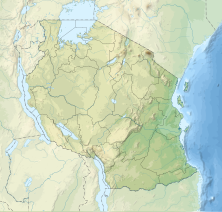Kimbiji Ruins
 Old Kimbiji Mosque | |
| Location | Kimbiji ward, Kigamboni District, Dar es Salaam Region, |
|---|---|
| Coordinates | 6°58′59.88″S 39°31′53.4″E / 6.9833000°S 39.531500°E |
| Type | Settlement |
| History | |
| Material | Coral rag |
| Founded | 10th century CE |
| Abandoned | 18th century CE |
| Cultures | Swahili |
| Site notes | |
| Condition | Endangered |
| Ownership | Tanzanian Government |
| Management | Antiquities Division, under the Ministry of Natural Resources and Tourism[1] |
| Architecture | |
| Architectural styles | Swahili & Islamic |
| Official name | Kimbiji Ruins Historic Site |
| Type | Cultural |
| Currently neglected and vandalized | |
Kimbiji Ruins (Swahili: Magofu ya mji wa kale wa Kimbiji) is a Medieval Swahili, National Historic Site located in Kimbiji ward of Kigamboni District in Dar es Salaam Region of Tanzania. Although the site has been vandalized by an illegally felled tree that fell on the mosque, the Tanzanian government is working to launch restoration measures as soon as possible.[2][3]
History
[edit]The location of this place is around 300 meters to the east of Kimbiji town. There are stone ruins there with a lot of indigenous and foreign pottery on the surface. Additionally, there is a mosque that is in ruins and is thought to have been built in the 18th century A.D. The land around the mosque is a cemetery, and the majority of the burials contain large fragments of European objects from the 18th and 19th centuries that were utilized in religious acts. Local potsherds were found in great quantity in a shovel test trench dug at the location, which was filled to a depth of 80 cm with them. The site may have been inhabited continuously for a very long time, according to finds from the deposits. [4][5]
See also
[edit]- Historic Swahili Settlements
- Kaole
- Kunduchi Ruins
- Msuka Mjini Ruins
- Kichokochwe Ruins
- Pujini Ruins
- Mbutu Bandarini
References
[edit]- ^ "Antiquities Division". Retrieved 21 Jul 2022.
- ^ "Contract of Restoration of Historical Structures in Kimbiji" (PDF). Retrieved 4 July 2023.
- ^ de Vere Allen, James (1981). "Swahili Culture and the Nature of East Coast Settlement". The International Journal of African Historical Studies. 14 (2): 306–334. doi:10.2307/218047. JSTOR 218047.
- ^ Kessy, Emmanuel (December 1997). "Archaelogical Sites Survey from Kisiju to Dar es Salaam" (PDF). Retrieved 4 July 2023.
{{cite journal}}: Cite journal requires|journal=(help) - ^ Felix A. Chami. (1994) The first millennium AD on the East Coast: a new look at the cultural sequence and interactions. Azania: Archaeological Research in Africa 29-30:1, pages 227-237

